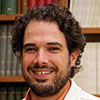Entering ophthalmology practice brings many new responsibilities, and with that stress. Fortunately, others have faced these challenges before you. Here’s how seven young ophthalmologists tackled some of their biggest early career stressors.
1. Lack of institutional knowledge
 How I solved it: Don’t be shy about asking the leaders in your department for help when you’re onboarding for a new position. They can direct you to people who can help you solve any problems that arise early on.
How I solved it: Don’t be shy about asking the leaders in your department for help when you’re onboarding for a new position. They can direct you to people who can help you solve any problems that arise early on.
And if you want to know how to get things done and build a referral network, you’ll need to meet as many people as possible. So be sure to ask everyone for some time to meet up. No one can refer to you if they don’t know that you’re there. Do this when you start out … and you will probably never have as much flexible time again!
—James G. Chelnis, MD
2. Patience (or lack thereof!)
 How I solved it: I am self-admittedly a massive perfectionist. These tendencies were compounded by my initial anxiety over joining a new practice and wanting to start off on the right foot. From the start, I constantly fought the urge to want everything optimized overnight — be it my schedule template, patient flow, tech workups or surgical experience. I even wrote a three-page protocol detailing how to screen new, return and internal-referral patient, plus meticulous step-by-step surgical instructions for my scrub techs. But I still felt frustrated when things didn’t go according to my protocols.
How I solved it: I am self-admittedly a massive perfectionist. These tendencies were compounded by my initial anxiety over joining a new practice and wanting to start off on the right foot. From the start, I constantly fought the urge to want everything optimized overnight — be it my schedule template, patient flow, tech workups or surgical experience. I even wrote a three-page protocol detailing how to screen new, return and internal-referral patient, plus meticulous step-by-step surgical instructions for my scrub techs. But I still felt frustrated when things didn’t go according to my protocols.
Now I remind myself that it takes time for others to adjust to my preferences as well as a little extra effort on my part to teach the team. As part of that process, we started conducting informal teaching sessions each month for our techs. During the lunch hour, one of our physicians rotates to discuss a chapter of the eye handbook.
The “perfect” team and work environment do not come pre-made; it’s an ongoing process to build towards it, bit by bit. In the meantime, frequently expressing gratitude for the help that I’m given each day goes a long way.
—Jiaxi Ding, MD
3. Making People Wait
 How I solved it: I try to analyze my clinic schedule regularly for inefficiencies or problems. Yes, some clinic delays and bottlenecks can be avoided by proactively managing the schedule details and staffing assignments. But emergencies and other curveballs do occur. Stressing over whether I am inconveniencing patients and staff doesn’t help anyone.
How I solved it: I try to analyze my clinic schedule regularly for inefficiencies or problems. Yes, some clinic delays and bottlenecks can be avoided by proactively managing the schedule details and staffing assignments. But emergencies and other curveballs do occur. Stressing over whether I am inconveniencing patients and staff doesn’t help anyone.
Instead, I do what I can to indicate my respect for everyone’s time, but I prioritize appropriate patient care over all else. More often than not, if I’m honest and communicative about the delay, patients and staff will be sympathetic. My knowledge of that fact modulates the stress (somewhat).
—D. Wilkin Parke III, MD
4. Joining a high-volume group with multiple locations
 How I solved it: When I joined a high-volume group straight out of fellowship, I had more anxiety than I anticipated when it came to operating in multiple hospitals. How would I manage the new teams? Would that retina stay attached? Would there be new equipment I wasn’t familiar with?
How I solved it: When I joined a high-volume group straight out of fellowship, I had more anxiety than I anticipated when it came to operating in multiple hospitals. How would I manage the new teams? Would that retina stay attached? Would there be new equipment I wasn’t familiar with?
Thank goodness my group established an introductory period to the clinic and OR. Consequently, I was able to observe retina, cataract, cornea and glaucoma specialists in the OR, introduce myself to staff and learn some new techniques at the same time. So when I had my first case, the stress was not altogether gone, but it was more manageable, and I felt at ease in the new surroundings.
No, not every retina will stay attached, but the opportunity to learn from my partnerswas a great stress relief. If you’re in a similar situation, use your colleagues and let them mentor you in the OR.
—Nathaniel Roybal, MD
5. Being the attending physician responsible for the care of my patients
 How I solved it: Shortly after entering practice, I lost sleep thinking about my patients and their operations and worrying over whether I was making the right decisions. To change that, I put things in perspective and increased my preparation.
How I solved it: Shortly after entering practice, I lost sleep thinking about my patients and their operations and worrying over whether I was making the right decisions. To change that, I put things in perspective and increased my preparation.
The first thing I did was tell myself, “You did not give your patient their condition/disease. You did not give them congenital glaucoma, colobomas, optic nerve hypoplasia or a persistent hyperplastic primary vitreous. It is your responsibility to treat them to the best of your ability given what medicine currently offers.”
I also began to read more and prepared for surgery diligently by watching my surgical videos from fellowship. Lastly, I made checklists for the operating room and then over-prepared and prepared some more. Over time, I became more comfortable with my responsibility of being an attending physician.
—Evan Silverstein, MD
6. Not having enough time to be a perfectionist
 How I solved it: If you’ve dedicated yourself to the years it takes to become an ophthalmologist, I’m sure you were never a slacker student. Even though it’s been a while since joining the “real world,” I still have this feeling that my patient notes need to be thorough, detailed and long … as if I’m still a med student being graded on my patient workups. But this mentality has led to skipped meals and long nights and weekends spent finishing notes and operative reports because I didn’t feel like I had enough time during working hours to write anything worthy of my perfectionist perspective. The end result was time lost from my personal life, significant weight loss, delays in billing, forgotten exam findings and overall inefficiencies.
How I solved it: If you’ve dedicated yourself to the years it takes to become an ophthalmologist, I’m sure you were never a slacker student. Even though it’s been a while since joining the “real world,” I still have this feeling that my patient notes need to be thorough, detailed and long … as if I’m still a med student being graded on my patient workups. But this mentality has led to skipped meals and long nights and weekends spent finishing notes and operative reports because I didn’t feel like I had enough time during working hours to write anything worthy of my perfectionist perspective. The end result was time lost from my personal life, significant weight loss, delays in billing, forgotten exam findings and overall inefficiencies.
This year, I’ve made a New Year’s resolution to finish every patient note before I can leave for the day, and I’ve made it a point to follow through with any plans that I have after work. This self-imposed time limit has forced me to evaluate my own efficiency. I delegate more responsibilities to staff and residents/fellows. I don’t worry about using abbreviations and incomplete sentences because I now realize I am not writing a Pulitzer Prize–winning novel. I excuse myself while typing in front of the patient, and now I see that the patients don’t feel like I’m being rude if I spend some time facing a computer instead of making eye contact with them the entire visit. Finally, I relax about being a perfectionist. So long as I am taking good care of my patients and good care of myself, efficiency beats perfectionism!
—Olivia L Lee, MD
7. Managing bad outcomes
 How I solved it: I’ve had a couple patients over the last year with extremely advanced, uncontrolled glaucoma in both eyes who had poor outcomes. Although their fields were less than 5 degrees wide, they all had decent preop visual acuity. In spite of uncomplicated surgeries and postop courses, they experienced rapid loss of central vision to the counting fingers range.
How I solved it: I’ve had a couple patients over the last year with extremely advanced, uncontrolled glaucoma in both eyes who had poor outcomes. Although their fields were less than 5 degrees wide, they all had decent preop visual acuity. In spite of uncomplicated surgeries and postop courses, they experienced rapid loss of central vision to the counting fingers range.
At first, I was reluctant to talk with them about surgery for the second eye. However, I found that open and honest conversation before surgery — and continuing the discussion afterwards — fostered a strong therapeutic relationship in spite of the poor outcomes.
—Jason Rupp, MD, PhD
About the authors:
James G. Chelnis, MD, is the chair of the YO Info editorial board. He is an oculoplastic and reconstructive specialist at the New York Eye and Ear Infirmary of Mount Sinai in New York City. He completed his ASOPRS training at Vanderbilt University and the University of Tennessee.
Jiaxi Ding, MD, is a glaucoma specialist at Carolina Eye Associates, a large multispeciality ophthalmology group in North Carolina. She completed her glaucoma fellowship at the University of Iowa and residency training at SUNY Buffalo.
D. Wilkin Parke III, MD, is a retina specialist at VitreoRetinal Surgery, PA, in Minneapolis. He completed his residency and fellowship at Bascom Palmer Eye Institute and co-directs the VRS retina fellowship.
Nathaniel Roybal, MD, splits his time between an assistant professorship at the University of New Mexico and a large multispecialty practice, Eye Associates of New Mexico, in Albuquerque. He completed his residency at UCLA and vitreoretinal fellowship at the University of Iowa.
Evan Silverstein, MD, is an assistant professor of ophthalmology and associate residency program director at Virginia Commonwealth University in Richmond, Va. He completed his residency at Vanderbilt University and a pediatric and adult strabismus fellowship at Duke University.
Jason D. Rupp, MD, is a glaucoma fellow at Washington University in St. Louis, where he also trains in complex anterior segment surgery. He joined the YO Info editorial board in 2016.
Olivia L. Lee, MD, is a cornea and uveitis specialist at UCLA. She is also the associate medical director of the Doheny Image Reading Center and the cornea fellowship director at Doheny Eye Center.